Did my Karma run over your Dogma? All is not lost; when one has a metaphysical poop scoop. Even dog doo has consciousness. Who is the unique idiot? Along with Helena Blavatsky, Rudolf Steiner, and Aleister Crowley, Georges Ivanovich Gurdjieff and Peter Demian Ouspensky were leading figures in the revival of occult and esoteric ideas in the early part of the twentieth century. Yet though steeped in occult wisdom, Gurdjieff brought to the study of esotericism a new and brutally austere doctrine. Human beings, he told his followers, are asleep, mere machines manipulated by the forces around them. Although they believe they are conscious and have free will, these are only illusions. Humanity’s only chance of freeing itself from this bondage is to awaken, a difficult and dangerous task requiring much work and tremendous efforts.
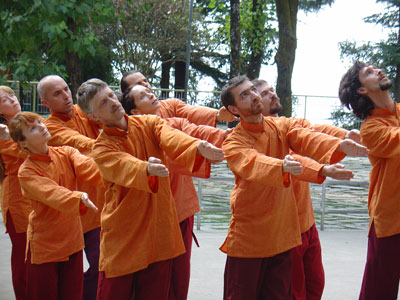
Geoff Olson:This brings us to the topic of Gurdjieff’s dance moves. At the outset of his strange career, Gurdjieff was a composer of a ballet, and identified himself in his book All and Everything as a “Teacher of dancing.” Hence the one peculiar facet of his teachings that lives on today, known as The Gurdjieffian Movements: difficult poses and contortions meant to aid in the process of awakening, based on the “sacred dances” Gurdjieff saw in his travels through Central Asia. Writes former Gnosis editor Jay Kinney: “They (The Movements) require the performer to maintain two or three different rhythms with different parts of the body, say, the head, arms, and feet, often while executing complicated dance steps. The difficulty of these “sacred dances” is obvious, but they accord with Gurdjieff’s goal of integrating the “three centers” so that a new , higher “I” can be created. As for the difficulty, Gurdjieff himself insisted that “only super-efforts count.””
To students familiar with talk of astral bodies, third eyes, and reincarnation, Gurdjieff’s message was cold, sobering, and provocative. Yet it had a ring of precision and practicality missing from the usual occult fare. Gurdjieff told his students that for people of the modern age, the original three “ways,” those of the fakir, the monk, and the yogi, were obsolete. What was needed was a new approach to raising consciousness, what Gurdjieff called the Fourth Way, and which its practitioners
soon referred to as the Work.
…Allen Ginsberg Journal:” At apartment of Ethel Broido a dream fades out in this morn in room with Gurdjieff who’s disappearing talking about farewell to Peter- We both sentimentaliize and agree that Peter sure was the perfect Russian servant of love- Gurdjieff behind a desk of the Commie embassy, I in door saing goodbye and high-I had that nite given Meged mushrooms #7″. …

---When a society feels stifled and strangled by too much logic and rationalism, it inevitably turns to mysticism. When materialism begins to crush a people′s sensitivity they turn to God and religion. And don′t think that Ginsberg, Sartre, Camus, and others who speak about the absurd, the illogical are like illiterate and ignorant villagers. They are great intellectuals of irrationalism. Their irrationalism, their turning to the unthinkable is not comparable to the ways of the believers, the faithful. It is a one-hundred-and-eighty-degree turn, like Chaitanya who after stretching thinking to its extremity, found that it was unthinkable.---
His methods involved various exercises designed to awaken the physical, emotional, and mental life of his followers, which he
claimed he had learned in secret monasteries in Central Asia. Physical labor, psychological drama, demanding dance movements,
and radically new techniques of focusing the mind were employed to help Gurdjieff’s pupils arrive at the grim realization
that they did not exist—at least not in any real sense. It was only after reaching this troubling insight, he told them, that they could begin to grasp what it meant to be conscious. Often the most persuasive means of arriving at this conclusion was Gurdjieff himself, whose powerful presence and extraordinary powers acted as both stimuli and goal.

Geoff Olson:While performing these complicated moves, pupils were expected to make difficult mathematical computations in their heads, and at the same time cry out phrases such as “God have mercy” to bring out their emotions. In this way, they supposedly would have all their centres — emotional, physical, and intellectual — come under full conscious control. In 1924 Gurdjieff and some of his disciples traveled to New York to put on a demonstration of The Movements at Carnegie Hall, winning even more converts to the Gurdjieffian way among Americans. On the face of it, this Pythonesque posturing sounds more silly than sacred, and you have to wonder if the benefit of these sort of exercises ever went beyond the transcendence-through-exhaustian that follows many cult-like exercises.
“Fusion, inner unity, is obtained by means of friction, by the struggle between “yes” and “no” in a man. In order to make further development possible he must be melted down again, and this can only be accomplished through terrible suffering.” One corollary of the Gurdjieffian system is that the human soul is not a given; one grows a soul through insight and sprititual development. Gurdjieff held that immortality could only be attained through “self remembering” — otherwise human beings remain at an animal level of awareness, and “die like dogs.”( Geoff Olson )
…’Trungpa ( Rinpoche) was very interested in what Gurdjieff had tried to do because, in a way, he was trying to do the same thing. They both were confronted with the task of taking an understanding that was born out of eastern spirituality and (in Gurdjieff’s case) the roots of eastern Christianity, and translating that into language that was accessible to contemporary culture.Gurdjieff spent three and a half years in Tibet. He wrote in Meetings With Remarkable Men, his autobiographical work, that he was taken to a central Asian monastery in Kashmir or Tibet called a monastery of the Sarmoung brotherhood. Now, Surmang, the seat of Trungpa’s lineage, is just a transposition of vowels, which I think, may conceal where Gurdjieff received much of his teaching”….
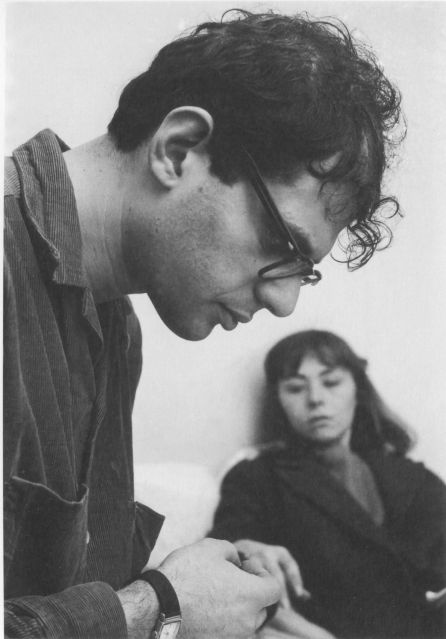
---So if Ginsberg′s statements and his poetry are illogical and irrational, it has nonetheless a system of its own. Nietzsche has said somewhere, "I am mad, but my madness has its own logic. I am not an ordinary madman; my madness has a method." This irrationalism is deliberate. It stands on its own ground, which cannot be the ground of logic. It is a candid, ingenuous refutation of rationalism. Certainly it will not base its assault upon logic; if it does, it will only support rationalism. No, it opposes rationalism through an irrational lifestyle.---
How does one explain the procedure in order to acquire a soul? ” To awake. To die To be born.” The cynical view is that Gurdjieff’s soul-by-decree operates like a superb spiritual make-work program. Who you gonna call if you suspect you haven’t cultivated a soul, or even awakened yet? Gurdjieff. And many people did just that,arriving from the four quarters of the globe to his “Institute for Harmonious Dev
ment,” opened at the close of the Great War at a chateau outside Fontainbleau, France.
J.W. Waterhouse. The Crystal Ball." Ann Seeker:And this was further reinforced because I had also been reading a section in In Search of the Miraculous in which Ouspensky relates what Gurdjieff says about 'doing.' Gurdjieff is speaking at a much deeper and more complex level but there are parallels with the not-doing in the Alexander Technique: "...man's chief delusion is his conviction that he can do. All people think that they can do, all people want to do, and the first question all people ask is what they are to do. But actually nobody does anything and nobody can do anything. This is the first thing that must be understood....To get rid of this conviction is more difficult than anything else for a man. You do not understand all the complexity of your organization and you do not realize that every effort, in addition to the results desired, even if it gives these, gives thousands of unexpected and often undesireable results, and the chief thing that you forget is that you are not beginning from the beginning with a nice clean, new machine. There stand behind you many years of a wrong and stupid life, of indulgence in every kind of weakness, of shutting your eyes to your own errors, of striving to avoid all unpleasant truths, of constant lying to yourselves, of self-justification, of blaming others, and so on, and so on."
So long as the disciples, a mix of celebrities, intellectuals, and professionals; stayed at Gurdjieff”s chateau, Prieuré d’Avon; they were under a strict regime. Orders for the day were posted each morning. A famous doctor would clean out the cowshed; a poet would chop wood for the furnace that would heat the Turkish bath being constructed; an American heiress would hoe the herb garden. And at the end of the day everybody would be called upon to perform the exercises, listen to lectures, and prepare for an exhibition of the sacred dances. Rehearsals took place in the “study room,” a large hall built by the students from parts of an old aircraft hangar. It was decorated with Oriental rugs, lighted by windows on which elaborate patterns were painted, and contained a special box in which Gurdjieff would sit to watch the performances.
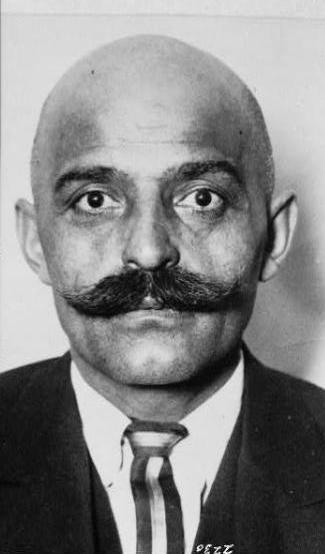
---Other aspects of the Gurdjieffian view of the human psyche were less subtle. In the master’s later years, pupils attending the dinners held at his Paris apartment were assigned to various categories of "idiots." Idiots could be "ordinary," "round," "zig-zag," and even "enlightened." There were a total of twenty-one types in total, the highest type being the "Unique Idiot," God himself. ---
In those early days at the Prieuré, a student would go to bed at two or three in the morning and rise at six. No one could escape Gurdjieff’s lash: “You all Dirt!” he would shout at them. No one was allowed to reach a plateau and stay there. The more advanced you were, the more you were expected to do. And then, into this atmosphere of enthusiasm, frenzy, chaos, and exalted dreams, came the thirty-four year-old Katherine Mansfield, in full expectation, so she said, of a cure for the tuberculosis that was destroying her lungs.
Yet the student of Gurdjieff’s work, or even the interested reader, soon discovers that the path to consciousness is not straight. Along with the many strange ideas he or she encounters, like “self-remembering,” “the Ray of Creation,” “the law of octaves,” and “super efforts,” a reader interested in the Fourth Way soon becomes entangled in a web of Byzantine politics and esoteric psychodrama, centered around the turbulent relationship between Gurdjieff and his most famous pupil, Ouspensky.
… “So he had to withstand pressures from all these different angles, and at the same time make something that someone like Allen Ginsberg could appreciate. I worked with Allen in New York for several years and he owed an immense debt to Trungpa. Allen would never have been able to connect with the dharma if he had just been taught in the Tibetan style. So transplanting buddhadharma into a western context was a very tricky thing to attempt and to carry out and Trungpa Rinpoche did it in a very short time”…
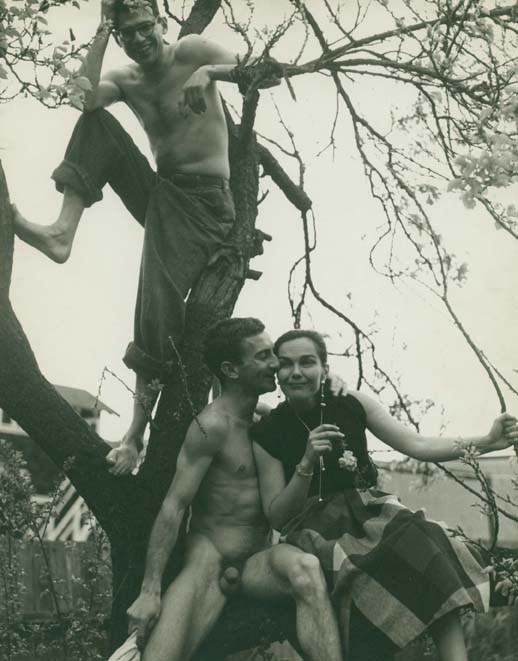
---People lacking in spiritual consistency and innate harmony weigh every word before they make a statement, because they are afraid that if two of their statements contradict each other their inner contradictions will be exposed. One can afford to be inconsistent only when one is consistent in his being. This Ginsberg is reading a poem which is full of inconsistencies and contradictions. It is an act of rare courage. Someone from among his listeners rises up in his seat and says, "You seem to be an audacious person, but to be audacious in poetry is nothing. Do you have the courage to act with audacity?" And Ginsberg looks up at the questioner, takes off his clothes and stands naked before his listeners saying, "This is the last part of my poetry." Then he says to the man who has interrupted him, "Now please take off your clothes and bare yourself."---
Far from being the final mystery in the history of the Fourth Way, the split between Ouspensky and Gurdjieff is rather the tip of the iceberg, the first of many troubling reflections to emerge from a fascinating Pandora’s box. Why, for instance, did a successful writer like Ouspensky abandon his career to devote himself to teaching the ideas of a man he had repudiated? Why did Gurdjieff draw Ouspensky into his circle in the first place? Was it simply to use him to advance his own designs? What had happened to turn the brilliant philosopher against his enigmatic teacher? Gurdjieff’s past was mysterious.
Did he really spend the years before his arrival in Moscow traveling through Central Asia as a member of an esoteric brotherhood
called the Seekers of Truth, as he had claimed? Or was he, as some have suggested, really a spy, working for the Tsar during the years of the Great Game? Why did Gurdjieff antagonize and alienate his best pupils, Ouspensky included? Was it a tactic in the difficult business of waking up? Or were there other reasons? Was Gurdjieff the superman many of his followers believed he was? Or did he have a dark side?
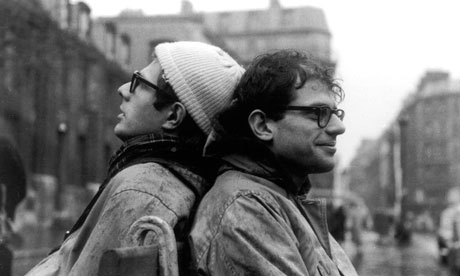
---This is a spontaneous act; it is not at all deliberate. And it is wholly illogical; it has nothing to do with Ginsberg′s poetry. No Kalidas, no Keats, no Rabindranath could do it; they are poets tied to tradition. We cannot think of Kalidas, or Keats, or Tagore baring himself the way Ginsberg does. Ginsberg could do it because he rejects logic, he refuses to confine life into the prison of syllogisms. He does not want to reduce life to petty mathematical calculations. He wants to live and live in freedom, and with abandon. A man like Ginsberg cannot be compared with a gullible villager. He represents the climactic point of a profound rationalist tradition. When a rationalist tradition reaches its climax and begins to die, people like Ginsberg come to the fore to repudiate the rational. ---
“There is so much life here that one feels no more than one little cell in a beefsteak,” she wrote to her husband after her arrival at Fontainebleu. This was in October of 1922; the institute was young, and much work remained to be done on the property. Miss mansfield was spared any serious exertion, but Gurdjieff, after giving her a luxurious room on the main floor, “the Ritz” he called it, later moved her to a poky little den that was always cold.
Mansfield wore her fur coat night and day, but was grateful for the lesson because it taught her how little she really needed in order to live. And soon afterward, in one of his unpredictable re-shufflings of the rooming arrangements, Gurdjieff put her back in her opulent quarters. Three months later, she died of a hemorrhage of the lungs.





 COMMENTS
COMMENTS